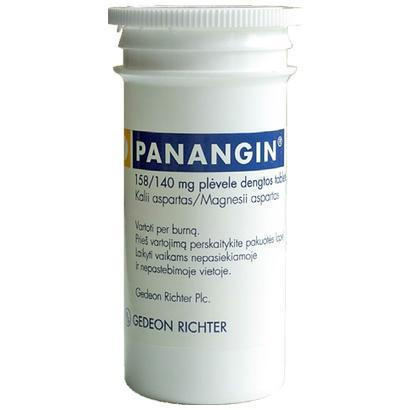Panangin pills number 50
Author Ольга Кияница
2017-05-11

| Amount in a package | 50 |
|---|---|
| Product form | Pills |
| Manufacturer | Gedeon Richter (Hungary) |
| Registration certificate | UA/7315/01/01 |
| The main medicament | Panangin |
| morion code | 4328 |
Patients with heart problems often in the form of maintenance therapy appoint Panangin, a drug developed for the prevention of cardiovascular diseases. The action of the drug, according to the instructions of Panangin, is the transport of potassium and magnesium salts into the body, which prevent the development of myocardial infarction and other serious diseases.
PANANGIN instruction manual
COMPOSITION AND FORM OF ISSUE:
Table. p / o, No. 50
| Potassium asparaginate | 158 mg |
| Magnesium asparaginate | 140 mg |
Other Ingredients: Silicon Colloid Anhydrous, Povidone, Magnesium Stearate, Talcum, Corn Starch, Potato Starch, Titanium Dioxide, Macrogol 6000, Eutragit E.
1 tablet contains 158 mg of potassium asparaginate anhydrous (corresponding to 36.2 mg of potassium), 140 mg of magnesium asparaginate anhydrous (corresponding to 11.8 mg of magnesium).
No. UA / 7315/01/01 from 16.11.2007 until 16.11.2012
PHARMACOLOGICAL PROPERTIES:
ions of potassium and magnesium are important intracellular cations. They play a major role in the functioning of many enzymes, in the binding of macromolecules to intracellular structures, and also participate in the molecular mechanisms of muscle contraction. The intra- and extracellular relationships of the ions K + , Mg 2+ , Na + , Ca 2+ affect the contractile function of the myocardium. Aspartate residue (aspartate) as an endogenous substance is an ion carrier, since it has a high affinity for cells. Aspartic acid salts dissociate slightly, so ions enter the cells as complex compounds. Aspartate potassium and magnesium improves myocardial metabolism. Deficiency of potassium and magnesium leads to the development of hypertension, coronary atherosclerosis, cardiac rhythm disturbances and myocardial dysfunction.
The drug is well absorbed when taken orally.
INDICATIONS:
additional therapy for chronic heart diseases (heart failure, condition after myocardial infarction), with heart rhythm disturbances (mainly in ventricular arrhythmias), with cardiac glycosides (to increase the efficiency and improve the tolerance of glycosides), alimentary hypokalemia and hypomagnesemia.
APPLICATION:
adults are prescribed orally 1 2 tablets 3 times a day. The dose can be increased to 3 tablets 3 times a day. Sour contents of the stomach can reduce the bioavailability of the drug, so Panangin is advisable to take after eating.
CONTRAINDICATIONS:
OPN and CRF, Addison's disease, AV-blockade III degree, cardiogenic shock (with systolic BP in adults 90 mm Hg).
SIDE EFFECTS:
when applying Panangin inside at high doses, there may be an increase in defecation.
SPECIAL INSTRUCTIONS:
special care should be taken when prescribing the drug to patients with a high risk of hyperkalemia. In such cases, it is necessary to regularly monitor the electrolyte homeostasis.
Data on the adverse effect of the drug during pregnancy and lactation are not available.
INTERACTIONS:
Panangin can inhibit the absorption of tetracycline, iron salts and sodium fluoride in the digestive tract. The interval between the use of these agents and Panangin should be at least 3 hours.
With the simultaneous use of Panangin with potassium-sparing diuretics and / or ACE inhibitors, the risk of hyperkalemia increases (the level of potassium in the blood plasma should be monitored).
OVERDOSE:
with long-term use of the drug cases of overdose are not described. Theoretically, overdose may develop signs of hyperkalemia and hypermagnesemia. When they appear, it is recommended to interrupt the course of treatment with Pananginum and to carry out symptomatic therapy (iv / 10% calcium chloride or calcium gluconate at a dose of 100 mg / min, if necessary hemodialysis).
STORAGE CONDITIONS:
at a temperature of 15-30 ° C.
